#day 7: calamity
Text
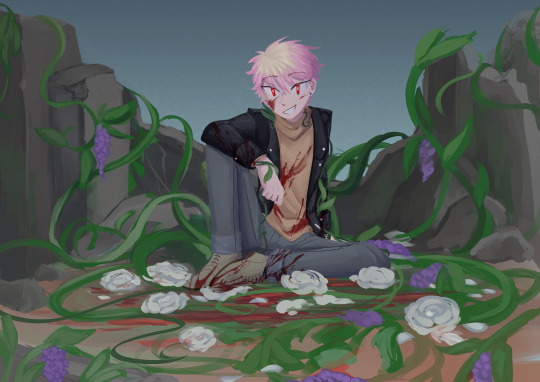
COEtober2022 day 7: Calamity
stupid pink haired mf flooded my sink <3
anyways! close ups!
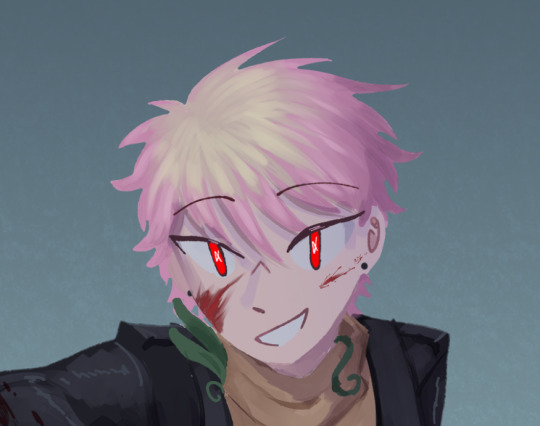
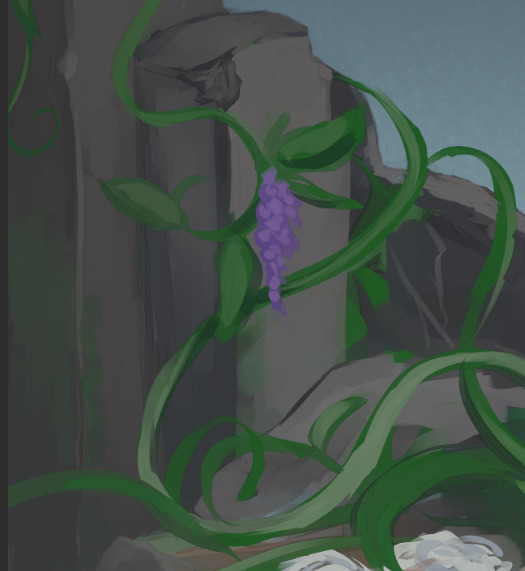
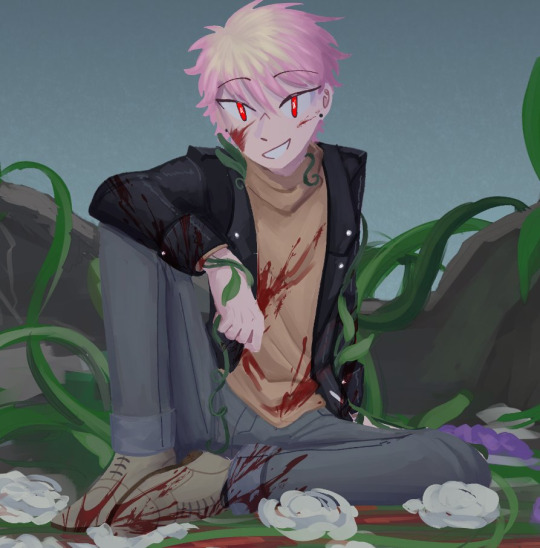
#cell of empireo#coetober2022#haruki atou#gavi no clicky#細胞神曲#세포신곡#alpha (coe)#atou haruki#coe spoilers#cell of empireo spoilers#arrival point e spoilers#my art#aria draws#I TRIED PAINTING#theres so much wrong with him <3#ill post the post ending e sitcom au too#day 7: calamity
21 notes
·
View notes
Text
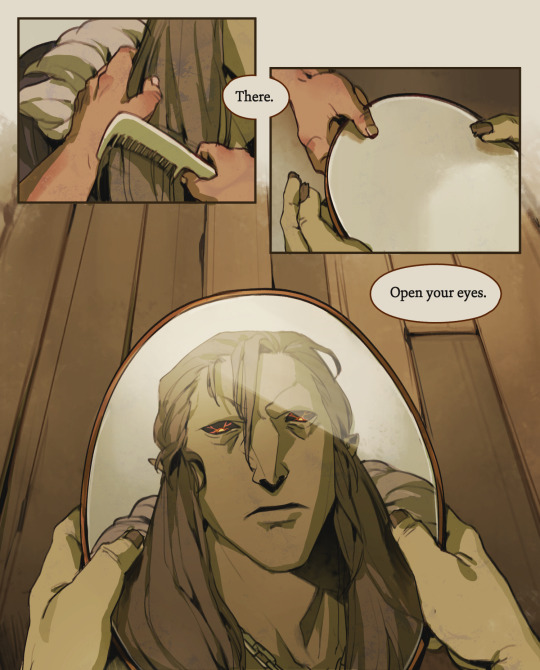
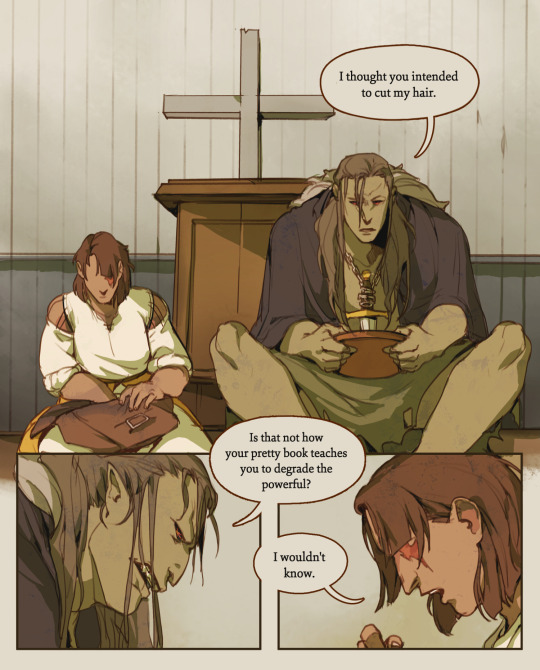
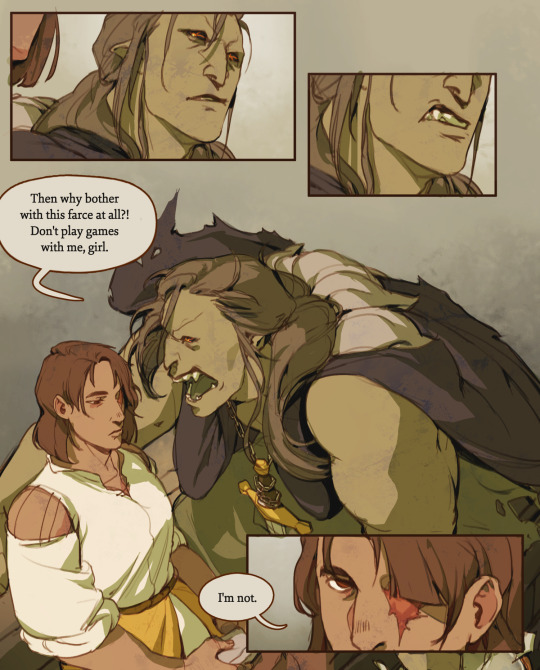

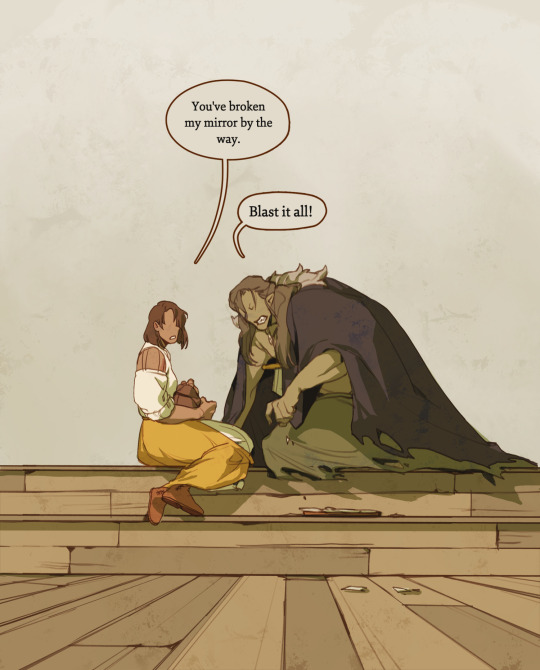
seeing clearer
(sequel to another comic of mine, the calamity.)
--
all my other comics
store
#cw: eye scarring#cw: christianity#as a theme. and not a particularly positive depiction either.#the calamity has anger issues but is earnestly trying her best#the survivor is patient#and also not scared of her at all#the calamity is talking about the story of samson and delilah in pg 2 btw#i tend to only make oneshot short story these days but im fond of this pair#had the urge to draw something a little mundane with these two and the slowest slow burn of a relationship you could ever imagine#also usually a broken mirror would equal 7 years of bad luck but the calamity so outclasses it as far as bad omens go#im pretty sure the effects are just cancelled out#anyway#next comic will be a different story entirely i promise#thank you for your patience#and as always#thank you for reading#comic art#sapphic art#stillindigo art#hearteaters#stillindigo comics
2K notes
·
View notes
Photo
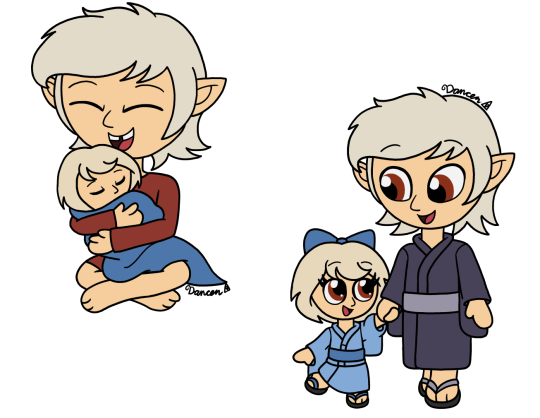
Hellooooo y’all guess what? NEW OC!
This precious little girl is Yoko, Haruto’s little sister! When she and her brother were young, they were very close. Inseparable, even. Haruto always did his best to watch over and protect his little sister
Although, something happened to her
That is info for the future however. For now, enjoy the happy little siblings!
@kaymeewise @lize-the-prophet More Haruto lore come get ya juice
#my ocs#haruto#yoko#age of calamity#a change of heart and mind#also YES we get to see BABY HARUTO AGAIN YAAAAY#i wanna say he's like 4 when yoko was born#and so in the second pic yoko is 3 and haru is 7#so ye#i shall reveal present day yoko in due time#also look at their little yukata#did i do good drawing them? the sleeves are harder to draw than i thought lol
10 notes
·
View notes
Text
A Cool River and Her Dearest Knight -- AO3

@zelinkweekofficial for zelink week 2022, day 7: healing
word count: 2.1k
rating: T
fandom: The Legend of Zelda: Breath of the Wild
summary: No matter how hard she scrubs, the blood never washes off.
#zelink week 2022#zelink week#zelink#zelda#link#loz#legend of zelda#botw#breath of the wild#post calamity#day 7#healing
23 notes
·
View notes
Link
Chapters: 1/1
Fandom: Transformers - All Media Types, The Transformers (IDW Generation One)
Rating: Teen And Up Audiences
Warnings: No Archive Warnings Apply
Relationships: Drift | Deadlock & Ratchet, Drift | Deadlock/Ratchet
Characters: Drift | Deadlock, Ratchet (Transformers)
Additional Tags: Hurt/Comfort, Non-Consensual Drug Use, Seizures, Medical Inaccuracies, Whumptober 2022, Past Drug Addiction, idk how transformer biology works so ????
Series: Part 2 of Whumptober 2022
Summary:
day 7: the way you shake and shiver (shaking hands, seizures, panic attack)
Drift finds his way to the medbay after shore leave.
(for @chiafett the most beloved)
#idk fuck all about Transformer biology#but I tried#calamity writing#ratchet#drift#transformers#dratchet#whumptober 2022#day 7#the way you shake and shiver
16 notes
·
View notes
Text

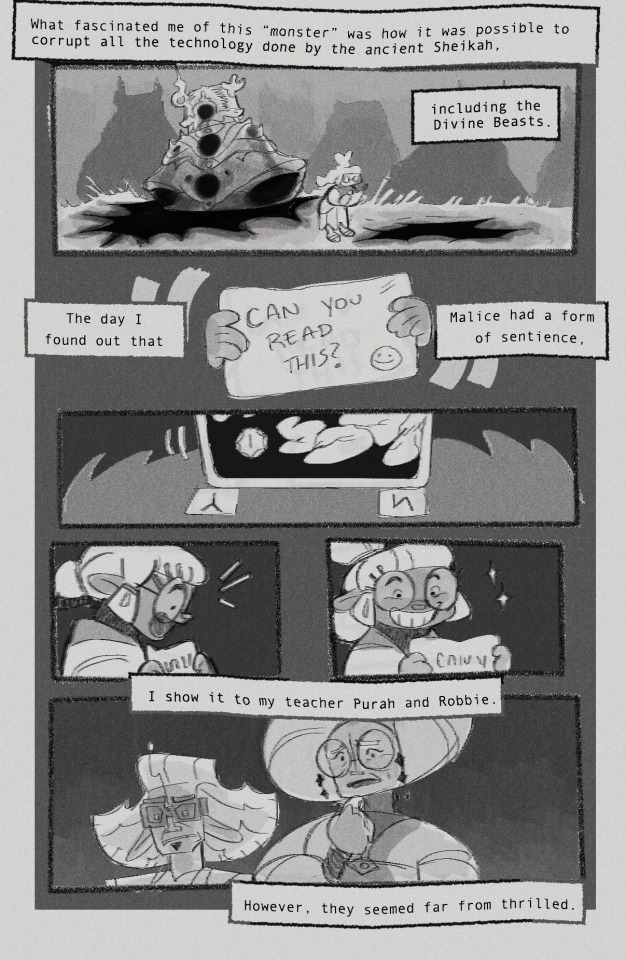
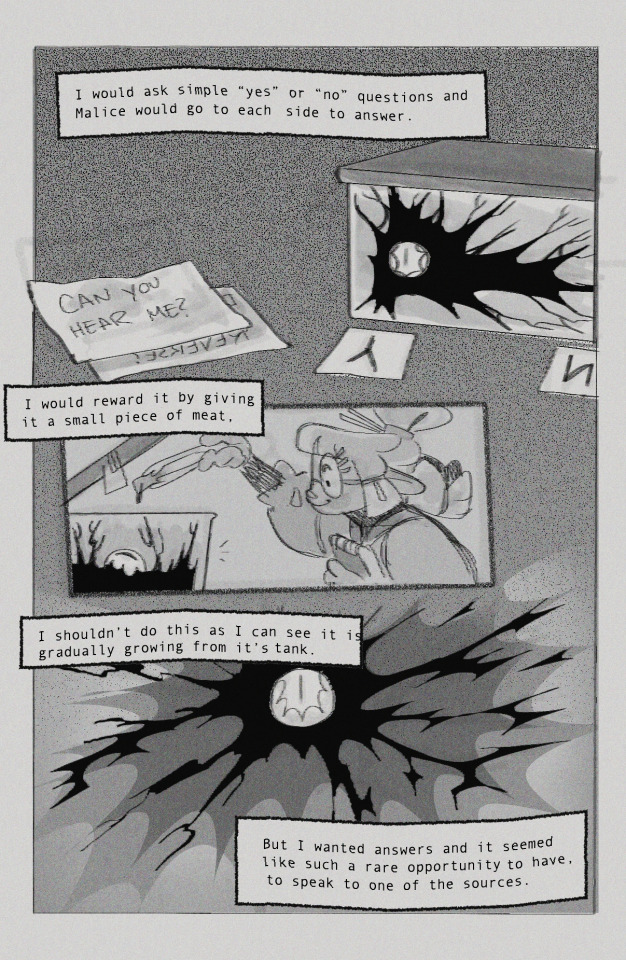
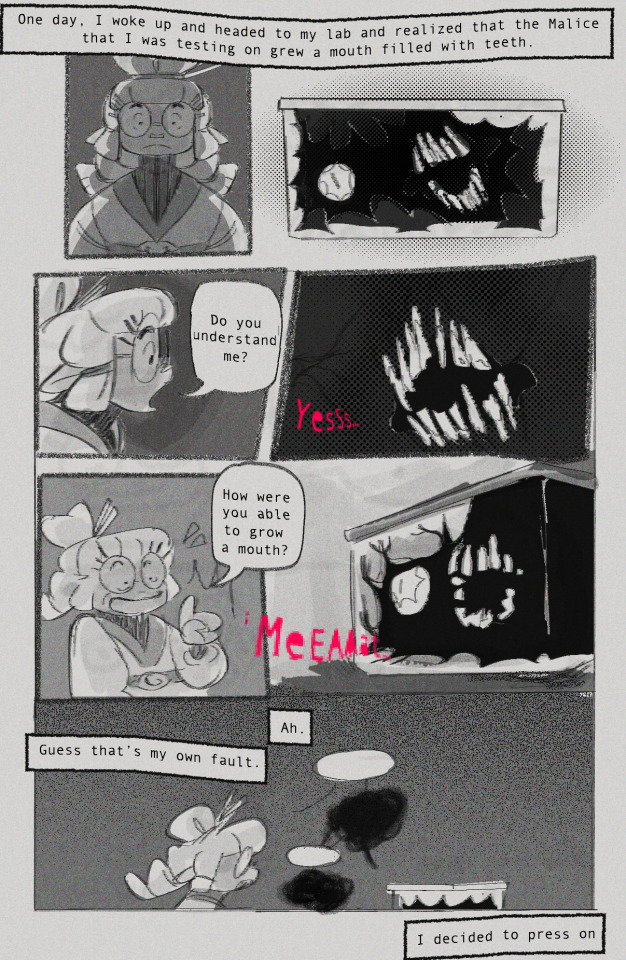

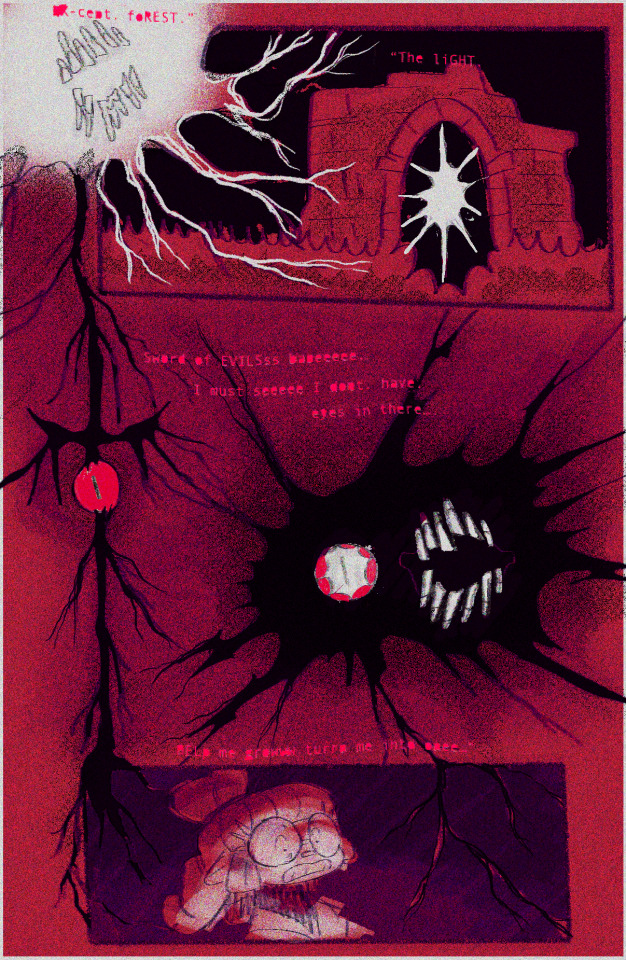
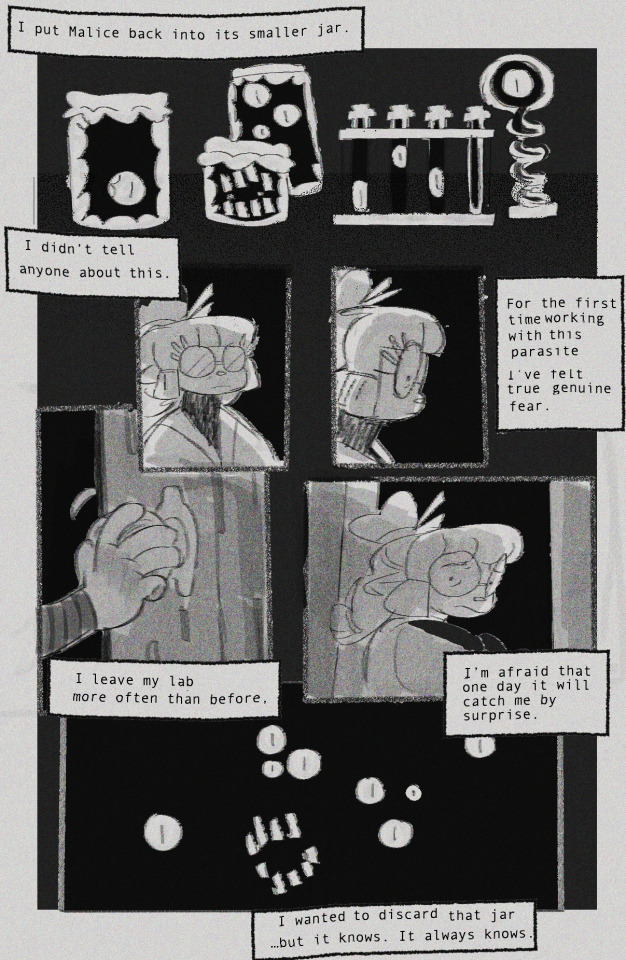
Josha the Malotologist
A short comic abt Josha and her cute little test subject Malice :] (Dialogue undercut!)
Page 1 -
I am Josha and I am an aspiring Malotologist. I created this new field as I want to study this fascinating parasite, and to teach and show others to not be afraid of it.
I was born a year after the attack occurred, while I wasn't really directly affected by it. In a way, me and other children have to deal with the aftermath of The Calamity.
Page 2 -
What fascinated me of this "monster" was how it was possible to corrupt all the technology done by the ancient Sheikah, including the Divine Beasts.
The day I found out that Malice has a form of sentience, I show it to my teacher Purah and Robbie.
However, they seemed far from thrilled.
Page 3 -
I would ask simple "yes" or "no" questions and Malice would go to each side to answer.
I would reward it by giving it a small piece of meat, I shouldn't do this as I can see it is gradually growing from it's tank.
But I wanted answers and it seemed like such a rare opportunity to have to speak to one of the sources.
Page 4 -
One day, I woke up and headed to my lab and realized that the Malice that I was testing on grew a mouth filled with teeth.
"Do you understand me?"
'Yes...'
"How were you able to grow a mouth?"
'Meat...'
Ah. Guess that's my own fault. I decided to press on
Page 5 -
"I have a question, how were you able to corrode and corrupt the Guardians and Divine Beasts?"
'Low...Guard...Pathetic.'
It did not gave me a cohesive answer that I--
‘I…use. Guards…to see…I have eyes
I see every-thing-Hyrule.
I eat to grow, consume.
I have eyes, I see. Everything.'
Page 6 -
'[Ex]-cept, forest.
The Light
Sword of Evil's Bane
I must see I don't. Have. Eyes in there...
Help me grow turn me into one...'
Page 7 -
I put Malice back into its smaller jar.
I didn't tell anyone about this. For the first time working with this parasite I've felt true genuine fear.
I leave my lab more often than before, I'm afraid that one day it will catch me by surprise.
I wanted to discard of that jar...but it knows. It always knows.
#i just realized there are a few grammatical errors *explodes into a million pieces*#tloz au#josha#malice king#my art#comic#LF au#horror#ask to tag
3K notes
·
View notes
Text
instagram
#tentaclemadestudios#7 days of creepmas#creepmas#sweater#guild of calamity#art challenge#art#illustration#drawing#digital art#Instagram
0 notes
Text
People knock on Rhoam for being a bad dad cuz he's distant and stern to little Zelda and say how Rauru is the goat (heh) for taking her in like his own daughter. Like Zelda had her real parental connection with Sonia and Rauru. But frankly that's a little reductive.
Rauru literally descended from the heavens, married a priest, started a kingdom. Man didn't really know much strife yet. There's no looming threat of calamity or prophecy yet. Things are peaceful. Things are fine. Things are great. Zelda dropped in during this time, talking about a doom that's going to happen tens of thousands of years in the future.
This sad, lost princess.
Of course any reasonable person would take her in and calm her and tell her she is fine and listen and support her.
Rhoam not being able to be this kind of figure for Zelda is tragic. Just read this poor man's journal entries:
"It has been a year and three months since her mother passed. Perhaps she is held back by heartache too deep to heal. If the Ganon prophecy wasn't looming over our heads, I would tell her to take her time... To wait until she is ready. But our situation is dire and leaves no room for weakness—even on behalf of my beloved daughter. My heart breaks for Zelda, but I must act as a king, not a father. I must order her to train relentlessly at the fountain." Pg 4.
"In truth, I understand Zelda's feelings. Painfully so. She lost her mother, her teacher, before she could learn from her. Ten pointless years of self-training, without so much as a book or note to help her find her way... Those in the castle talk behind her back. And I, her only family, scold her for her shortcomings. No wonder she wishes to hide away in her beloved relic research. I'd love nothing more than to console her... But I must stay strong. She MUST fulfill her duty, just as we all must. Even if she comes to despise me." Pg 6.
"I have been told my Zelda went to the Spring of Wisdom... This will likely be her last chance. If she is unable to awaken her power at Lanayru, all hope is truly lost. If she comes back without success, then I shall speak kindly with her. Scolding is pointless now. I forced 10 years of training on her... and after all that, it seems her power will stubbornly awaken some other way. Perhaps I should encourage her to keep researching her beloved relics. They may just lead her to answers I can't provide. For now, I sit anxiously, more a father than a king in this moment. I sit and await my daughter's return." Pg 7. (He fucking dies and never gives Zelda this bit of closure uuuugggghhhhhhh Zelda I'm so sorry Rhoam I'm so sorry)
It sucks because most people remember the cutscenes (duh it's more immersive and important) and in the cutscenes of the first game Rhoam was mostly shown as being stern and mean to babygirl Zelda, who is closed fists explaining herself to him at the verge of tears. And in contrast everyone in the first royal family of hyrule in the second game treated her with such kindness and we can see how happy she was being there with them.
Rhoam was shackled by duty. By prophecy. By the looming calamity. And from the day he named his daughter 'Zelda' he shackled her as well.
And what does Zelda do with these shackles? She accepts them. She tolerates them. Because she loves her father and her kingdom and knows there's a power dormant in her that can stop the calamity that she must do her best to unlock. She does this dutifully. She does all the training, she does everything that is required.
But it still doesn't unlock. So she tries other ways. She isn't just going after the 'relics' because she's scholarly and nerdy and wants to learn about them. She does it because she's pragmatic. She knows her sacred sealing power isn't present in her. She knows she might not be able to control it or even unlock it in time.
So she tries this alternative approach. The Divine Beasts, the guardians. Ancient tech that was used to prevent the calamity of their time. And she awakened the tech. And her father chose the champions for each divine beast. And they were all prepared. And it's all thanks to Zelda.
And then... Fucking tragedy again. Ganon probably learned his lesson from the last time he was thwarted and immediately went for the tech, corrupting it and turning it against the new users. Against Zelda.
It's never really stated how fast it all turned to shit when the tech betrayed them (or maybe I don't remember) but every account points to it being almost overnight. The champions died. Rhoam died. And suddenly, suddenly Zelda unlocks her sealing magic.
I always always hate the literary trope of using tragedy to unlock a great power that could've actually stopped the tragedy from happening in the first place.
And it's no different in BOTW. I hate that Zelda had to go through all this to unlock her powers.
And then what happens next?
She's stuck in limbo (in an almost mocking parallel to Rauru in the next game with his imprisoning arm) holding Ganon back. For a hundred years.
This young woman had gone through so much only to be trapped with a calamity seeking to destroy Hyrule for a century.
Does she know her father died in the war? Does she know the champions died in battle? Would she know Link would survive in the Shrine of Resurrection? Would she know how long it would all take? The century she would have to wait?
I think she didn't. I think it all happened too fast. I think ultimately, she decided a stalemate with ganon was an agreeable outcome. I think in her mind she probably thought she failed Hyrule. When the divine beasts turned she must have been distraught. Distraught might not even cover it tbh. But at least... At least when the kingdom was brought to it's knees by the corrupted tech and was waiting for the final blow, she had the ability to ensure the final blow never came.
And oh boy I have a looot more to talk about regarding Tears of the Kingdom. But I do want to have a couple of more playthroughs of it to really formulate what I want to say.
#zelda#zelink#totk thoughts#loz spoilers#totk spoilers#the legend of zelda#legend of zelda#tloz botw#tloz totk#loz totk#loz botw#loz tears of the kingdom#tears of the kindom spoilers#breath
2K notes
·
View notes
Text

[FEM READER!]
Just imagine. Sea Serpent! Reader who is EXTREMELY HUGE/TALL. Like this is one piece man everyone is tall a$$ fvck bro, but like in Google it says that a sea serpent is 60.96 metres or 200 feet in my research so uh.. IMAGINE Sea Serpent! Reader who just woke up from a hibernation and already started going attention from the World Government, they try their best to recruit you so they sent the admirals but ohhh boy.
Since Akainu, Kizaru and Kuzan were the first person you've met after a very long time, you picked them up on their coats like how a mother cat picks up their kittens and how they tried their best to get out of your grasp but when you put them on your hands near your BIG BWEEBIES (I LOVE BEWBIES :3 I'm a fucking lesbo) . They really tried their best not to look on your chest (Kizaru is trying his best.) Akainu being the more professional one he tried his best to follow his orders while Kizaru and Kuzan were just basically using the devil fruits around you.
Kizaru could just be in your palms and in a second next to your shoulders, while Aokiji was secretly using the highest temperature he could do so he can see your reaction (kinda kinky ngl). Akainu is out here trying his best not to melt those two. You really tried your best to listen to Akainu's proposal yet you can't when you're out here squishing each of the Admirals cheeks:3



Let's say you agreed to be in the marines cuz why not? It's been a long time since you felt the thrill of an adventure! And somehow you were already high ranked because of your brutal strength, plus your fishmen karate you could practically control tides. The world government tried their best to not let your presence be known in public cuz bro. YOU ARE BASICALLY A WALKING HISTORY BOOK FOR HOW OLD YOU ARE.
You were immediately given a high ranks as a Vice Admiral, the world government then gave you a house...or beach?...Body of water? I DUNNO but a big place with water that's your home :3. You only spend most of your days, there only being visited by higher ups and the forced isolation were already yandere tendencies to the Admirals + Platonic Yanderes such as Sengoku and Garp.
Corazon and Coby (Sea Serpant! Reader was found way before) were only exeptions to see you, and they were immediately HEAD OVER HEELS. Corazon could not think straight or THINK whenever you're mention in a conversation, he would just immediately day dream. Size difference? I mean yea the only smallest form you can turn is like 20 feet or something BUT IT CAN WORK IT WILL WORK (take that as you can 😈) Sengoku is Corazon number 1 hype man🔥 While Garp is Koby's hype man lol :3
Now if you were lucky enough to even have some kind of freedom but if some kind of MIRACLE you were placed as a Vice Admiral picking up the Warlords when it comes to a serious meeting it would be an interesting sight, let's just say that they went to the meeting not because they were interested in the shit show of a meeting but they do want to see the 200 feet tall Sea Serpent again...
AND QIQBAIA8 And since you were found long before, let's imagine that you were a Rocks Pirate. (I HAVEN'T READ THE MANGA YET SO SORRY IF MY INFORMATIOM OF THE ROCKS PIRATES SUCKS). You were the eye candy of the Rocks Pirate. Big Mom, Kaido, and Newgate would always be 24/7 ON YOUR SIDE, they will one make you join their family one day !!
After many years they are still doing so, Kaido making you marry one of his calamities. The Tobi Ropo even tried some flirty moves on you, but Yamato. Dear lord. Even with or without his father's consent YAMATO. WILL. MARRY. YOU. END. OF. STORY.
You and King got really close after you tell some brief mentions of the Lunarian race back on your days, and that's what bonded you guys, yet everytime he was near you and you started talking about his race, he can only day dream of you with a traditional Lunarian ring (or any courting object), on your hands with....children around you with brown skin, black wings with fire, some has some long tails that suspectedly looks similar to yours...Wait. IS HE THINKING THAT YOU AND HIM CAN RE POPULATE THE WHOLE LUNARIAN RACE WITH A MIX OF YOURS! END HIM NOW!!
While Yamato is out here telling you that you are his Toki to his Oden, (corny, but its Yamato I forgive him :3) and since he's Oden, he must create a family with you! He would thunder bagua anyone's ass if they tried to even break his dream! No more of that!!
And you know the drill YEAA BIG MOM, RAGGH. Big Mom out here making you marry any of her children especially her Sweet Generals, the best for you ♡
You and Katakuri connect when it comes to your sharp teeths, plus Katakuri never felt so small in someone eyes until he met you, the very first time he layed his head on your cheek or your long tail as you sweetly careless him telling him to let go of his stress, he never felt this way..he felt so well treated, he now just Katakuri, the Katakuri that didn't need to hide his sharp teeth, instead loved from you. He never felt this way of submission...
Cracker and Smoothie too felt the same, their mother is a bad one indeed so when they are on your presence they could just relax and be caresses by you while they lay on your chest ♡ (Cracker isn't looking, he swear he isn't 👀)
Whitebeard is the same as those two but more cunning perhaps (in his own way). Both Kaido and Linlin are evil yes. But Whitebeard might be a pirate but he is far from evil, he is an honorable pirate the clashed with the greatest Pirate of all time, he has that (DAWG IN HIM) sense of respect, his opinion and decisions are always noble ones too, so what ever he says must be true and reasonable...right?
Do you like Marco, his first division a healer who would take absolute care about you, or Ace his second division, you would never get bored with him while he is around! Izo? The Samurai who was a follower of the Great Kozuki Oden! He dances so elegant from his homeland! Choose my dear, he just wants you to be apart of his family so badly!!
I can yap about this all day but I got school yall plus I don't really think any of you will like this idea. Also whoever tries to even have sex with Sea Serpent! Reader, their ass would NOT be walking the next day💀👆🔥




Hide yall ladies/manz Sea Serpent! Reader is in town😞‼️
#i love big ladies 💓💓 lesbian activities :3!!#Sea Serpent! Reader#yandere op#yandere one piece x reader#yandere one piece#one piece#one piece x reader#yandere big mom#yandere Akainu Sakazuki#yandere Kizaru borsalino#yandere Aokiji Kuzan#yandere marines#yandere pirates#yandere warlords#yandere corazon#yandere coby#platonic yandere#yandere katakuri charlotte#yandere cracker charlotte#yandere smoothie Charlotte#yandere kaido#yandere whitebeard#yandere marco the phoenix#yandere x reader#yandere#yandere Portgas D. Ace#yandere izo#yandere king the wildlife#yandere yamato#tobi roppo
468 notes
·
View notes
Text
Round 7, Day 2 - Pretender versus Gunner versus Avenger
A lone figure walked through the forest, idly looking around before his eyes fell on a figure-- the de-facto ruler of this part of the map. The Gunner smirked, hand resting on a hidden pocket, ready to draw weapons.
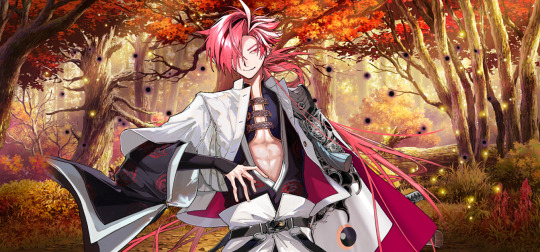
"And there he is, the Servant of the hour. How about we put on a show? You seem like the type that'll like that."
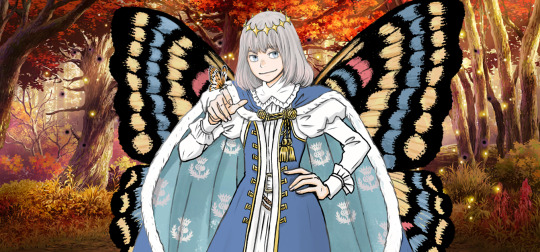
"Maybe-- but we're not alone."

A moment passed, as the Pretender jumped out of the way, narrowly dodging a flaming sword that ripped through one of the trees.
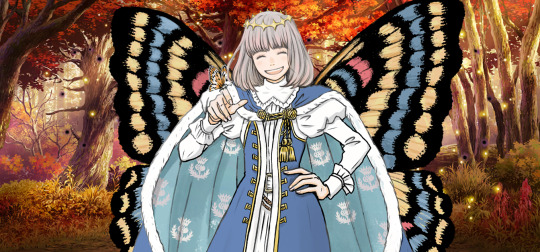
"Wow. would you look at that? Avenger finally shuffled out of his dusty little hole. Did you finally remember there was a Grail War going on?"
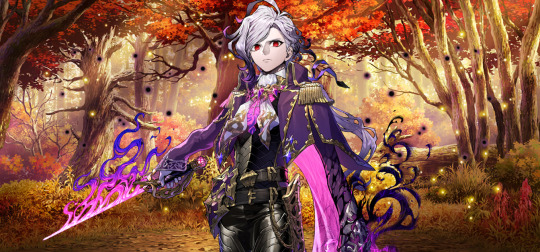
"Joke all you like, you cannot stall me. Now, behold the all-consuming flames of an Avenger!"
The Avenger swung his dark blade, black flames striking at the dense woods around them. Of course, when flame hits kindling, the sparks quickly lead to calamity. The quiet forest erupted into flames, the sparks backlighting the ghastly grin of the Avenger, and the amused smirk of the Gunner.
The Pretender frowned.
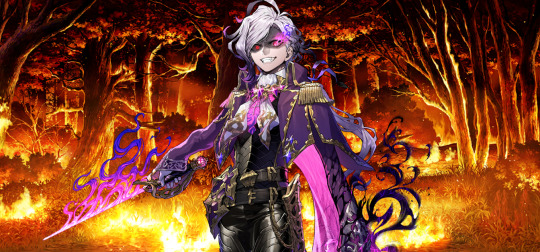
"Oho? Am I seeing a spark in your eyes, Pretender? We haven't spoken much, but you seemed rather unflappable before. And you, Gunner... let this serve as my formal introduction! Hahahaha!"
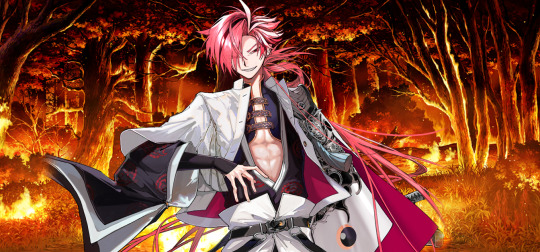
"Look at that! Ladies and gentlemen, keep your eyes peeled! It seems like this fight is going to be pretty interesting!"

"...Yeah, alright. Let's rumble!"
Pretender has 1 wound! 2 more and he'll be defeated!
Gunner has 1 wound! 2 more and he'll be defeated!
Due to Avenger's Defensive Play choices, Avenger gains a +1% bonus to Free-for-All's!
Due to the boost from Avenger's Defensive Play bonus, Gunner's 'Unconventional Child Prodigy' skill activates!
The boosts for this round are...
Oberon: +3%
Takasugi Shinsaku: +5%
The Count of Monte Cristo: +4%
Servant Skills:
Oberon (Pretender)
Evening Shroud (EX Rank) - In the cover of night, even the most unconfident warriors can at least feign greatness. When engaged in a Free-for-All, gain a +3% boost.
Morning Lark (EX Rank) - As morning comes, as does a boost in morale. Demerits against Oberon are reduced in effectiveness by 3%, and he gains a +3% boost in one-on-one battles.
A Midsummer Night's Dream (EX Rank): Rather than just reducing the effectiveness of Servant-imposed demerits, he is immune to them entirely.
PRETENDER-CLASS Servants possess an inherent trickster nature. If they fall in last place during a Free-for-All, if there is a gap of 3% within their final score and that of the Servant in 2nd place, they can evade taking a wound. Additionally, if they're victorious against other Servants, other teams cannot attempt to study the Pretender in order to gain a percentage bonus against them.
Takasugi Shinsaku (Gunner)
Unconventional Child Prodigy (A Rank): When fighting someone with a higher boost than Gunner, gain +2%.
Innovate - Armaments Reformation (B Rank): Defeating a Servant once will net special 'components' from them. When at least 4 of those 'components' are gathered, a secondary Noble Phantasm will be unlocked. If 6 are gathered, then the utility and power of 'Kiheitai' will be upgraded.
Current Components: N/A
(Winning first place in a Free-for-All will count for gathering 2 components- one for each Servant beneath you).
Retaining the Japanese Spirit (A Rank): When Gunner is about to take a fatal blow and the difference between scores is less than 5%, survive with one 'health' remaining. If this is triggered, gain a persistent +2% bonus that cannot be reduced or removed.
GUNNER-Class Servants are quick to action and yet methodical with their attacks. When engaged in combat, gain a +3% boost. Additionally, if in last place during a Free-for-All, inflict a -4% demerit on the 1st place Servant.
The Count of Monte Cristo (Avenger)
Determination of Steel (EX Rank): If Avenger is about to take a fatal wound, if there's at least a 3% difference in their score and the victor above him, he may avoid damage. When facing a single-target (1-on-1), he will gain a +3% boost.
Monte Cristo Mythologie: The King of the Cavern (C Rank): When battling enemies, his flames are like a poison. He reduces demerits against him by 3%, and when he is victorious against another, he inflicts a -2% demerit for their next round. This demerit increases by 2% by every 10% difference in scores.
Wisdom of Predicament (A Rank): When engaged in a Free-for-All, gain a +3% boost. Additionally, if Avenger earns last place, both the victor and the 2nd place Servant gain a -2% demerit, rather than simply the 2nd place Servant.
AVENGER-CLASS Servants are vengeful by nature. The first time they are defeated by a Servant, they gain an automatic +2% bonus against that specific Servant, without needing to study them (but can in order to increase the bonus). They gain a permanent +3% bonus per wound they attain that will remain if the wound remains, but will disappear if the wound is healed.
173 notes
·
View notes
Text
𝐖𝐞𝐝𝐧𝐞𝐬𝐝𝐚𝐲 𝐀𝐝𝐝𝐚𝐦𝐬 | 𝐌𝐚𝐬𝐭𝐞𝐫𝐥𝐢𝐬𝐭

Yours only
You make Wednesday feel something she never felt before; jealousy. And maybe a bit of something else too.
Deep devotion
Over time you came to realize more and more that sometimes Wednesday wears her words like armor. They become almost futile when you learn she speaks through actions.
Scorch marks
ch 1 | ch 2 | ch 3
Wednesday has been careful to keep what you two have behind closed doors and far away from labels; but when someone starts to take it — take you — away from her, she realizes how much she cares.
Sweet calamity
ch 1 | ch 2 | ch 3 | ch 4 | ch 5 | ch 6 | ch 7 | ch 8 | ch 9 | pretty secrets | ch 10 | birthday girl
It was something people described as the sweetest pain, the feeling of when the soul that’s destined to find yours is closer to you. Wednesday saw it as a curse, promised herself she would hate whoever was chosen for her; but it’s easier said than done.
Love the way you love me
You navigate through a relationship with Wednesday, slowly discovering the tenderness of her love.
Don’t know how to be something you miss
ch 1 | ch 2
On a rainy day, Wednesday recalls pieces of your story together through memories, and wonders if you miss her too.
Tender as the rain
You find Wednesday walking alone in the rain.
I guess that’s love
Wednesday sees herself stuck in the memory of one night; the night you almost died. She feels it’s her fault, your blood on her hands says as much.
I told the moon about you | Darling darkness
Wednesday finds herself enchanted by the black wolf who always watches her play the cello in the dead of night.
Christmas Specials
cinnamon and spice | crimson and white | golden ballads | find the beauty | dark trees are better | the heart that matches mine
Headcanons
Romantic
1K notes
·
View notes
Text
I'm alive and thought of a different subject to write headcannons for. I'm more than happy to hear any feedback, but take my headcannons with a grain of salt. I tried to make it accurate enough so enjoy!
Best to worse hygiene in the Chain:
1. Warriors
2. Calamity
3. Legend
4. First
5. Fierce Diety
6. Four
7. Koridai
8. Time
9. Courage
10. Sky
11. Twilight
12. Wind
13. Sage
14. Wild
15. Hyrule
Here is my reasoning for the best to worse hygiene in the Chain:
1. Warriors
• I have to put him at the top cause jojo even stated that he does try and keep up his appearance on their journey. He does seem like the type to try and always seem presentable in any circumstances. So, I'd say he'd be the one to bath the most out of the Chain.
• He's also a knight and I do believe that knights had a different standard for cleanliness than others. (But Warriors takes it to another level)
• He might not have the beauty routines and what not like the modern day, but he's very thorough with cleaning himself.
• He'd take two showers before climbing in a bath. He would have a small hand bag for all his toiletries; soap, shampoo (I don't think Hyrule would have conditioner in any of the era's honestly), some nice smelling oils or something to keep up a fresh smell. Stops in villages/towns usually have him going and restocking everything, potions, armour, weapons and hygiene items.
• He have two particular scents that he prefers and often switches between the two.
• Basically the man's the cleanest a person could get in any Hyrule.
2. Calamity
• Again, knights I believe have a certain standard with hygiene. Him also being Natura/Flora's personal knight would mean he'd have to be more clean and hygienic than other knights.
• He's not scared to get his hands dirty, but I can see Natura/Flora yelling at him to wash his hands because of a little dirt. I can definitely see most of the Zelda's being neat freaks.
• He's got a simple routine thats straight forward. He also doesn't spend too much time in the shower/bath, but that doesn't mean he's not thorough though.
• He also just grabs whatever soap and shampoo he can get his hands on in villages/towns when he notices he's running low.
• He's the type to unconsciously scrub too hard and get rashes because of it.
• He's the one to get Wild and Sage to take bathes with a lot of fighting.
3. Legend
• Legend is sensitive to smell - don't ask why but he does.
• This man is the one to judge everyone else if he catches a whiff of them smelling off. He's not afraid to call them out in their odours and will try and get them to go and bath immediately.
• He does surprisingly keep himself in a routine, he makes sure to shower and then bath (if the circumstances allow it) every second day.
• He likes to do a thorough job with washing in the shower and then taking a long relaxing bath afterwards.
• He takes the second longest with bathing - after Warriors of course - not because he's got a lengthy routine like Wars, but he does have imaginary arguments/debates while he's busy.
• I can see him being picky with the smell of his soap and shampoo. He would take ages in villages/towns/markets just to find something that smells nice to him.
• He also doesn't like sharing his soap or shampoo with anyone, unless he deems it absolutely necessary like getting Wind, Wild and Hyrule to bath.
#linked universe#linkeduniverse#linked universe x reader#linked universe hyrule#linked universe legend#linked universe sky#linked universe twilight#linked universe warriors#linked universe wind#linked universe time#linked universe wild#linked universe fierce diety#linked universe koridai#linked iniverse courage#linked universe four#linked universe sage#linked universe calamity#lu wind#lu wild#lu sky#lu time#lu twilight#lu legend#lu warriors#lu four#lu hyrule
136 notes
·
View notes
Text
If Benjamin Netanyahu had accepted defeat in June 2021, finally yielding the stage to a coalition of his opponents, he could have retired at the age of 71 with a decent claim to having been one of Israel’s more successful prime ministers.
He had already surpassed the time in office of Israel’s founder, David Ben-Gurion, becoming the country’s longest-serving prime minister in 2019. His second stretch in office, from 2009 to 2021, coincided with perhaps the best 12 years Israel had known since its founding in 1948. The country enjoyed relative security, with no major wars or prolonged Intifadas. The period was one of uninterrupted economic growth and prosperity. Thanks to its early adoption of widespread vaccination, Israel was one of the first countries in the world to emerge from the coronavirus pandemic. And toward the end of that span came three agreements establishing diplomatic relations with Arab countries; more were likely on the way.
Twelve years of Netanyahu’s leadership had seemingly made Israel more secure and prosperous, with deep trade and defense ties across the world. But this wasn’t enough to win him another term. A majority of Israelis had tired of him, and he had been tainted by charges of bribery and fraud in his dealings with billionaires and press barons. In the space of 24 months, Israel held four elections ending in stalemate, with neither Netanyahu nor his rivals winning a majority. Finally, an unlikely alliance of right-wing, centrist, left-wing, and Islamist parties managed to band together and replace him with his former aide Naftali Bennett in June 2021.
At that point, Netanyahu could have sealed his legacy. A plea bargain on offer from the attorney general would have ended his corruption trial with a conviction on reduced charges and no jail time. He would have had to leave politics, probably for good. Over the course of four decades in public life, including 15 years as prime minister and 22 as the Likud party’s leader, he had already left an indelible mark on Israel, dominating the second half of its history. But he couldn’t bear the thought of giving up power.
Within 18 months, he was back as prime minister for the third time. The unwieldy coalition that replaced him had imploded, and this time around, Netanyahu’s camp of far-right and religious parties ran a disciplined campaign, exploiting the weaknesses of their divided rivals to emerge with a small parliamentary majority, despite still being virtually tied in the vote count.
Nine months later, Netanyahu, the man who promised, above everything else, to deliver security for Israel’s citizens, presided over the darkest day in his country’s existence. A total breakdown of the Israeli military and intelligence structure allowed Hamas to breach Israel’s border and embark on a rampage of murder, kidnapping, and rape, killing more than 1,100 Israelis and taking more than 250 hostage. The calamities of that day, the failures of leadership leading up to it, and the traumas it caused will haunt Israel for generations. Even leaving completely aside the war he has prosecuted since that day and its yet-unknown end, October 7 means that Netanyahu will always be remembered as Israel’s worst-ever leader.
How does one measure a prime minister?
There is no broadly accepted ranking of the 13 men and one woman who have led Israel, but most lists would feature David Ben-Gurion at the top. Not only was he the George Washington of the Jewish state, proclaiming its independence just three years after a third of the Jewish people had been exterminated in the Holocaust, but his administration established many of the institutions and policies that define Israel to this day. Other favorites include Levi Eshkol, for his shrewd and prudent leadership in the tense weeks before the Six Day War, and Menachem Begin, for achieving the country’s first peace agreement with an Arab nation, Egypt.
All three of these men had mixed records and detractors, of course. Ben-Gurion had autocratic tendencies and was consumed by party infighting during his later years in office. After the Six Day War, Eshkol failed to deliver a coherent plan for what Israel should do with the new territories it occupied and the Palestinians who have remained under its rule ever since. In Begin’s second term, Israel entered a disastrous war in Lebanon, and his government nearly tanked the economy. But in most Israelis’ minds, these leaders’ positive legacies outweigh the negatives.
Who are the “worst prime ministers”? Until now, most Israelis regarded Golda Meir as the top candidate for that dismal title. The intelligence failure leading to the Yom Kippur War was on her watch. Before the war, she rejected Egyptian overtures toward peace (though some Israeli historians have recently argued that these were less than sincere). And when war was clearly imminent, her administration refrained from launching preemptive attacks that could have saved the lives of hundreds of soldiers.
Other “worst” candidates have included Ehud Olmert, for launching the second Lebanon war and becoming Israel’s first former prime minister to go to prison for corruption; Yitzhak Shamir, for kiboshing an agreement with Jordan’s King Hussein that many believe could have been a significant step toward resolving the Israel-Palestinian conflict; and Ehud Barak, for spectacularly failing to fulfill his extravagant promises to bring peace with both the Palestinians and Syria.
But Benjamin Netanyahu now surpasses these contenders by orders of magnitude. He has brought far-right extremists into the mainstream of government and made himself, and the country, beholden to them. His corruption is flamboyant. And he has made terrible security decisions that brought existential danger to the country he pledged to lead and protect. Above all, his selfishness is without parallel: He has put his own interests ahead of Israel’s at every turn.
Netanyahu has the distinction of being the only Israeli prime minister to make a once reviled movement on the right fringe of the country’s politics into a government stakeholder.
Rabbi Meir Kahane, the founder of a Jewish-supremacist group called Kach, won a lone seat in the Knesset in 1984. He openly called for replacing Israeli democracy with a constitution based on the laws of the Torah and for denying Israel’s Arab citizens equal rights. During Kahane’s single legislative term, the entire Israeli political establishment shunned him. When he got up to speak in the Knesset, all of its members would leave the plenum.
In 1985, Likud joined other parties in changing election law so that those who denied Israel’s democratic identity, denied its Jewish identity, or incited racism could be barred from running for office. Under this provision, Kach was never allowed to compete in another election. Kahane was assassinated in New York in 1990. Four years later, a member of his movement killed 29 Muslims at prayer in Hebron, and the Israeli government proscribed Kach as a terror organization and forced it to disband.
But the Kahanists didn’t go away. With each Israeli election, they tried to rename their movement and adjust its platform to conform with electoral law. They remained ostracized. Then, in 2019, Netanyahu saw a roadblock on his path to reelection that they could help him get around.
Several Israeli parties had pledged not to serve in a government led by an indicted prime minister—quite possibly, enough of them to shut Netanyahu out of power. To prevent that from happening, Netanyahu needed to eke out every possible right-wing and religious vote for his potential coalition. The polls were predicting that the latest Kahanist iteration, the Jewish Power party, which is led by the thuggish but media-savvy Itamar Ben-Gvir, would receive only about 10,000 votes, well below the threshold needed to make the party a player on its own; but Netanyahu believed that if he could persuade the Kahanists and other small right-wing parties to merge their candidates’ lists into a joint slate, together they could win a seat or two for his potential coalition—just what he needed for a majority.
Netanyahu began pressuring the leaders of the small right-wing parties to merge their lists. At first the larger of these were outraged. Netanyahu was meddling in their affairs and, worse, trying to coerce them to accept the Kahanist outcasts. Gradually, he wore down their resistance—employing rabbis to persuade politicians, orchestrating media campaigns in the nationalist press, and promising central roles in future administrations. Media figures close to Netanyahu accused Bezalel Smotrich, a fundamentalist settler and the new leader of the religious Zionist party, of “endangering” the nation by making it easier for the hated left to win the election. Soon enough, Smotrich’s old-school national-religious party merged not only with Ben-Gvir’s Jewish Power but with an even more obscure, proudly homophobic party led by Avi Maoz.
Netanyahu did worry a bit about the optics. Throughout five stalemated election campaigns from 2019 to 2022, Likud coordinated closely with Jewish Power, but Netanyahu refused to be seen in public with Ben-Gvir. During the 2022 campaign, at a religious festival, he even waited backstage for Ben-Gvir to leave the premises before going up to make his speech.
Two weeks later, there was no longer any need to keep up the act. Netanyahu’s strategy succeeded: His coalition, merged into four lists, edged out its squabbling opponents with 64 of the Knesset’s 120 seats.
Netanyahu finally had the “right-wing in full” government he had often promised. But before he could return to the prime minister’s office, his allies demanded a division of the spoils. The ministries with the most influence on Israelis’ daily lives—health, housing, social services, and the interior—went to the ultra-Orthodox parties. Smotrich became finance minister; Maoz was appointed deputy minister in charge of a new “Agency for Jewish Identity,” with power to intervene in educational programs. And Ben-Gvir, the subject of numerous police investigations for violence and incitement over a period of three decades, was put in charge of a newly titled “Ministry of National Security,” with authority over Israel’s police and prison services.
As Netanyahu signed away power to the Kahanists, he told the international news media that he wasn’t forming a far-right government. The Kahanists were joining his government. He would be in control. But Netanyahu hadn’t just given Israel’s most extreme racists unprecedented power and legitimacy. He’d also insinuated them into his own formerly mainstream party: By March 2024, Likud’s candidates for local elections in a handful of towns had merged their slates with those of Jewish Power.
Likud long prided itself on combining staunch Jewish nationalism, even militarism, with a commitment to liberal democracy. But a more radical stream within the party eschewed those liberal values and championed chauvinistic and autocratic positions. For much of the past century, the liberal wing was dominant and provided most of the party’s leadership. Netanyahu himself espoused the values of the liberal wing—until he fell out with all the main liberal figures. By 2019, none was left to oppose the alliance with Ben-Gvir’s Kahanists.
Now more than a third of Likud’s representatives were religious, and those who weren’t preferred to call themselves “traditional” rather than secular. They didn’t object to cooperating with the Kahanists; indeed, many had already worked with them in the past. In fact, many Likud Knesset members by that point were indistinguishable from the Jewish Power ones. Israel’s worst prime minister didn’t just form an alliance of convenience with the country’s most irresponsible extremists; he made them integral to his party and the running of the state.
That Netanyahu is personally corrupt is not altogether novel in the history of the Israeli prime ministership. What makes him worse than others is his open contempt for the rule of law.
By 2018, Netanyahu was the subject of four simultaneous corruption investigations that had been in motion for more than a year. In one, known as Case 4000, Netanyahu stood accused of promising regulatory favors to the owner of Israel’s largest telecom corporation in return for favorable coverage on a popular news site. Three of the prime minister’s closest advisers had agreed to testify against him.
Investigations of prime ministers are not rare in Israel. Netanyahu was the subject of one during his first term. The three prime ministers who served in the decade between his first and second terms—Ehud Barak, Ariel Sharon, and Ehud Olmert—had all been investigated as well. Only in Olmert’s case did police deem the evidence sufficient to mount a prosecution. At the time, in 2008, Netanyahu was the leader of the opposition.
“We’re talking about a prime minister who is up to his neck in investigations and has no public or moral mandate to make fateful decisions for Israel,” Netanyahu said of Olmert. “There is a concern, I have to say real, not without basis, that he will make decisions based on his personal interest of political survival and not on the national interest.”
Ten years later, Netanyahu would be the one snared in multiple investigations. Then he no longer spoke of corruption in high office but of a “witch hunt,” orchestrated by rogue police commanders and left-wing state prosecutors, and egged on by a hostile news media, all with the aim of toppling a right-wing leader.
Netanyahu was determined to politicize the legal procedure and pit his supporters against Israel’s law-enforcement agencies and judiciary. Never mind that the two previous prime ministers who had resigned because of corruption charges were from the center left. Nor did it matter that he had appointed the police commissioner and attorney general himself; both were deeply religious men with impeccable nationalist backgrounds, but he tarred them as perfidious tools of leftist conspiracy.
Rather than contemplate resignation, on May 24, 2020, Netanyahu became the first sitting Israeli prime minister to go on trial. He has denied all wrongdoing (the trial is still under way). In a courthouse corridor before one session, he gave a 15-minute televised speech accusing the legal establishment of “trying to topple me and the right-wing government. For over a decade, the left wing have failed to do this at the ballot box, and in recent years have come up with a new idea. Elements in the police and prosecutor’s office have joined left-wing journalists to concoct delusional charges.”
The law didn’t require Netanyahu to resign while fighting the charges against him in court. But doing so had seemed logical to his predecessors under similar circumstances—and to Israel’s lawmakers, who had never envisaged that a prime minister would so brazenly challenge the justice system, which he had a duty to uphold. For Netanyahu, however, remaining in power was an end in itself, one more important than preserving Israel’s most crucial institutions, to say nothing of Israelis’ trust in them.
Netanyahu placed extremists in positions of power, undermined confidence in the rule of law, and sacrificed principle to power. Little wonder, then, that last summer, tensions over the role of Israel’s judiciary became unmanageable. The crisis underlined all of these reasons that Netanyahu should go down as Israel’s worst prime minister.
For 34 of the past 47 years, Israel’s prime ministers have come from the Likud party. And yet many on the right still grumble that “Likud doesn’t know how to rule” and “you vote right and get left.” Likudniks complain about the lingering power of “the elites,” a left-wing minority that loses at the ballot box but still controls the civil service, the upper echelons of the security establishment, the universities, and the media. A growing anti-judicial wing within Likud demands constitutional change and a clamping-down on the supreme court’s “judicial activism.”
Netanyahu had once minimized these complaints, but his stance on the judiciary changed after he was indicted in 2019. Indeed, at the start of his current term, Likud’s partners demanded commitments to constitutional change, which they received. The ultra-Orthodox parties were anxious to pass a law exempting religious seminary students from military service. Such exemptions had already fallen afoul of the supreme court’s equality standards, so the religious parties wanted the law to include a “court bypass.” Netanyahu acceded to this. To pass the legislation in the Knesset, he appointed Simcha Rothman, a staunch critic of the court, as the chair of the Knesset’s Constitution Committee.
He also appointed Yariv Levin, another fierce critic of the court, as justice minister. Just six days after the new government was sworn in, Levin rolled out a “judicial reform” plan, prepared by a conservative think tank, that called for drastically limiting the court’s powers to review legislation and gave politicians control over the appointment of new justices.
Within days, an extremely efficient counter-campaign pointed out the dangers the plan posed, not just to Israel’s fragile and limited democracy, but to its economy and security. Hundreds of thousands of Israelis protested in the streets. Likud began to drop in the polls, and Netanyahu privately urged the leaders of the coalition parties to delay the vote. They refused to back down, and Levin threatened to resign over any delay.
Netanyahu’s motives, unlike those of his partners, were not ideological. His objective was political survival. He needed to keep his hard-won majority intact and the judges off-balance. But the protests were unrelenting. Netanyahu’s independent-minded defense minister, Yoav Gallant, pointed to the controversy’s dire implications for the Israel Defense Forces as hundreds of volunteer reserve officers threatened to suspend their service rather than “serve a dictatorship.”
Netanyahu wasn’t sure he wanted to go through with the judicial coup, but the idea of one of Likud’s senior ministers breaking ranks in public was unthinkable. On March 25 of last year, Gallant made a public statement that the constitutional legislation was a “clear and major threat to the security of Israel” and he would not be voting for it. The next evening, Netanyahu announced that he was firing Gallant.
In Jerusalem, protesters besieged Netanyahu’s home. In Tel Aviv, they blocked main highways. The next morning, the trade unions announced a general strike, and by that evening, Netanyahu backed down, announcing that he was suspending the legislation and would hold talks with the opposition on finding compromises. Gallant kept his post. The talks collapsed, protests started up again, and Netanyahu once again refused to listen to the warnings coming from the security establishment—not only of anger within the IDF, but that Israel’s enemies were planning to take advantage of the country’s disunity to launch an attack.
The debate over judicial reform pitted two visions of Israel against each other. On one side was a liberal and secular Israel that relied on the supreme court to defend its democratic values; on the other, a religious and conservative Israel that feared that unelected judges would impose incompatible ideas on their Jewish values.
Netanyahu’s government made no attempt to reconcile these two visions. The prime minister had spent too many years, and all those toxic electoral campaigns, exploiting and deepening the rift between them. Even when he belatedly and halfheartedly tried to rein in the radical and fundamentalist demons he had ridden back into office, he found that he could no longer control them.
Whether Netanyahu really meant to eviscerate Israel’s supreme court as part of a plot to weaken the judiciary and intimidate the judges in his own case, or whether he had no choice in the matter and was simply a hostage of his own coalition, is immaterial. What matters is that he appointed Levin as justice minister and permitted the crisis to happen. Ultimately, and despite his professed belief in liberal democracy, Netanyahu allowed Levin and his coalition partners to convince him that they were doing the right thing—because whatever kept him in office was right for Israel. Democracy would remain strong because he would remain in charge.
Trying to diminish the powers of the supreme court isn’t what makes Netanyahu Israel’s worst prime minister. The judicial reform failed anyway. Only one of its elements got through the Knesset before the war with Hamas began, and the court struck it down as unconstitutional six months later. The justices’ ruling to preserve their powers, despite the Knesset’s voting to limit them, could have caused a constitutional crisis if it had happened in peacetime. But by then Israel was facing a much bigger crisis.
Given Israel’s history, the ultimate yardstick of its leaders’ success is the security they deliver for their fellow citizens. In 2017, as I was finishing my unauthorized biography of Netanyahu, I commissioned a data analyst to calculate the average annual casualty rate (Israeli civilians and soldiers) of each prime minister since 1948. The results confirmed what I had already assumed. In the 11 years that Netanyahu had by then been prime minister, the average annual number of Israelis killed in war and terror attacks was lower, by a considerable margin, than under any previous prime minister.
My book on Netanyahu was not admiring. But I felt that it was only fair to include that data point in his favor in the epilogue and the very last footnote. Likud went on to use it in its 2019 campaigns without attributing the source.
The numbers were hard to argue with. Netanyahu was a hard-line prime minister who had done everything in his power to derail the Oslo peace process and prevent any move toward compromise with the Palestinians. Throughout much of his career, he encouraged military action by the West, first against Iraq after 9/11, and then against Iran. But in his years as prime minister, he balked at initiating or being dragged into wars of his own. His risk aversion and preference for covert operations or air strikes rather than ground operations had, in his first two stretches in power, from 1996 to 1999 and 2009 to 2021, kept Israelis relatively safe.
Netanyahu supporters on the right could also argue, on basis of the numbers, that those who brought bloodshed upon Israel, in the form of Palestinian suicide bombings and rocket attacks, were actually Yitzhak Rabin and Shimon Peres, the architects of the Oslo Accords; Ehud Barak, with his rash attempts to bring peace; and Ariel Sharon, who withdrew Israeli soldiers and settlers unilaterally from Gaza in 2005, creating the conditions for Hamas’s electoral victory there the following year. That argument no longer holds.
If future biographers of Israeli prime ministers undertake a similar analysis, Netanyahu will no longer be able to claim the lowest casualty rate. His 16th year in office, 2023, was the third-bloodiest in Israel’s history, surpassed only by 1948 and 1973, Israel’s first year of independence and the year of the Yom Kippur War, respectively.
The first nine months of 2023 had already seen a rise in deadly violence in the West Bank and East Jerusalem, as well as terrorist attacks within Israel’s borders. Then came the Hamas attack on October 7, in which at least 1,145 Israelis were massacred and 253 kidnapped and taken to Gaza. More than 30 hostages are now confirmed dead.
No matter how the war in Gaza ends, what happens in its aftermath, or when Netanyahu’s term finally ends, the prime minister will forever be associated above all with that day and the disastrous war that followed. He will go down as the worst prime minister because he has been catastrophic for Israeli security.
To understand how Netanyahu so drastically failed Israel’s security requires going back at least to 2015, the year his long-term strategic bungling of the Iranian threat came into view. His mishandling didn’t happen in isolation; it is also related to the deprioritization of other threats, including the catastrophe that materialized on October 7.
Netanyahu flew to Washington, D.C., in 2015 to implore U.S. lawmakers to obstruct President Barack Obama’s nuclear deal with Iran. Many view this gambit as extraordinarily damaging to Israel’s most crucial alliance—the relationship with the United States is the very bulwark of its security. Perhaps so; but the stunt didn’t make subsequent U.S. administrations less supportive of Israel. Even Obama would still go on to sign the largest 10-year package of military aid to Israel the year after Netanyahu’s speech. Rather, the damage Netanyahu caused by presuming too much of the United States wasn’t to the relationship, but to Israel itself.
Netanyahu’s strategy regarding Iran was based on his assumption that America would one day launch an attack on Iran’s nuclear program. We know this from his 2022 book, Bibi: My Story, in which he admits to arguing repeatedly with Obama “for an American strike on Iran’s nuclear facilities.” Senior Israeli officials have confirmed that he expected Donald Trump to launch such a strike as well. In fact, Netanyahu was so sure that Trump, unlike Obama, would give the order that he had no strategy in place for dealing with Iran’s nuclear program when Trump decided, at Netanyahu’s own urging, to withdraw from the Iran deal in May 2018.
Israel’s military and intelligence chiefs had been far from enamored with the Iran deal, but they’d seized the opportunity it presented to divert some of the intelligence resources that had been focused on Iran’s nuclear program to other threats, particularly Tehran’s network of proxies across the region. They were caught by surprise when the Trump administration ditched the Iran deal (Netanyahu knew it was coming but didn’t inform them). This unilateral withdrawal effectively removed the limitations on Iran’s nuclear development and required an abrupt reversal of Israeli priorities.
Senior Israeli officials I spoke with had to tread a wary path here. Those who were still in active service couldn’t challenge the prime minister’s strategy directly. But in private some were scathing about the lack of a coherent strategy on Iran. “It takes years to build intelligence capabilities. You can’t just change target priorities overnight,” one told me.
The result was a dissipation of Israeli efforts to stop Iran—which is committed to the destruction of Israel. Iran sped further than ever down the path of uranium enrichment, and its proxies, including the Houthis in Yemen and Hezbollah on Israel’s northern border, grew ever more powerful.
In the months leading up to October 7, Israel’s intelligence community repeatedly warned Netanyahu that Iran and its proxies were plotting a major attack within Israel, though few envisaged something on the scale of October 7. By the fall of 2023, motives were legion: fear that an imminent Israeli diplomatic breakthrough with Saudi Arabia could change the geopolitics of the region; threats that Ben-Gvir would allow Jews greater access to the al-Aqsa Mosque in Jerusalem and worsen conditions for Palestinian prisoners; rumors that the deepening tensions within Israeli society would render any response to an attack slow and disjointed.
Netanyahu chose to ignore the warnings. The senior officers and intelligence chiefs who issued them were, to his mind, conspiring with the law-enforcement agencies and legal establishment that had put him on trial and were trying to obstruct his government’s legislation. None of them had his experience and knowledge of the real threats facing Israel. Hadn’t he been right in the past when he’d refused to listen to leftist officials and so-called experts?
Hamas’s surprise attack on October 7 was the result of a colossal failure at all levels of Israel’s security and intelligence community. They had all seen the warning signals but continued to believe that the main threat came from Hezbollah, the larger and far better-equipped and trained enemy to the north. Israel’s security establishment believed that Hamas was isolated in Gaza, and that it and the other Palestinian organizations had been effectively deterred from attacking Israel.
Netanyahu was the originator of this assumption, and its biggest proponent. He believed that keeping Hamas in power in Gaza, as it had been for nearly two years when he returned to office in 2009, was in Israel’s interest. Periodic rocket attacks on Israeli communities in the south were a price worth paying to keep the Palestinian movement split between the Fatah-dominated Palestinian Authority in the West Bank enclaves and Hamas in Gaza. Such division would push the troublesome two-state solution off the global agenda and allow Israel to focus on regional alliances with like-minded Arab autocracies that also feared Iran. The Palestinian issue would sink into irrelevance.
Netanyahu’s disastrous strategy regarding Gaza and Hamas is part of what makes him Israel’s worst prime minister, but it’s not the only factor. Previous Israeli prime ministers, too, blundered into bloody wars on the basis of misguided strategies and faulty advice from their military and intelligence advisers.
Netanyahu stands out from them for his refusal to accept responsibility, and for his political machinations and smear campaigns since October 7. He blames IDF generals and nourishes the conspiracy theory that they, in alliance with the protest movement, somehow allowed October 7 to happen.
Netanyahu believes that he is the ultimate victim of that tragic day. Convinced by his own campaign slogans, he argues that he is the only one who can deliver Israel from this valley of shadows to the sunlit uplands of “total victory.” He refuses to consider any advice about ending the war and continues to prioritize preserving his coalition, because he appears incapable of distinguishing between his own fate, now tainted by tragic failure, and that of Israel.
Many around the world assume that Israel’s war with Hamas has proceeded according to some plan of Netanyahu’s. This is a mistake. Netanyahu has the last word as prime minister and head of the emergency war cabinet, but he has used his power mainly to prevaricate, procrastinate, and obstruct. He delayed the initial ground offensive into Gaza, hesitated for weeks over the first truce and hostage-release agreement in November, and is now doing the same over another such deal with Hamas. For the past six months, he has prevented any meaningful cabinet discussion of Israel’s strategic goals. He has rejected the proposals of his own security establishment and the Biden administration. He presented vague principles for “the day after Hamas” to the cabinet only in late February, and they have yet to be debated.
However one views the war in Gaza—as a justified war of defense in which Hamas is responsible for the civilian casualties it has cynically hidden behind, or as an intentional genocide of the Palestinian people, or as anything in between—none of it is Netanyahu’s plan. That’s because Netanyahu has no plan for Gaza, only one for remaining in power. His obstructionism, his showdowns with generals, his confrontations with the Biden administration—all are focused on that end, which means preserving his far-right coalition and playing to his hard-core nationalist base.
Meanwhile, he’s doing what he has always done: wearing down and discrediting his political opponents in the hope of proving to an exhausted and traumatized public that he’s the only alternative. So far, he’s failing. Polls show that an overwhelming majority of Israelis want him gone. But Netanyahu is fending off calls to hold an early election until he believes he is within striking distance of winning.
Netanyahu’s ambition has consumed both him and Israel. To regain and remain in office, he has sacrificed his own authority and parceled out power to the most extreme politicians. Since his reelection in 2022, Netanyahu is no longer the center of power but a vacuum, a black hole that has engulfed all of Israel’s political energy. His weakness has given the far right and religious fundamentalists extraordinary control over Israel’s affairs, while other segments of the population are left to pursue the never-ending quest to end his reign.
One man’s pursuit of power has diverted Israel from confronting its most urgent priorities: the threat from Iran, the conflict with the Palestinians, the desire to nurture a Westernized society and economy in the most contested corner of the Middle East, the internal contradictions between democracy and religion, the clash between tribal phobias and high-tech hopes. Netanyahu’s obsession with his own destiny as Israel’s protector has caused his country grievous damage.
Most Israelis already realize that Netanyahu is the worst of the 14 prime ministers their country has had in its 76 years of independence. But in the future, Jews might even remember him as the leader who inflicted the most harm on his people since the squabbling Hasmonean kings brought civil war and Roman occupation to Judea nearly 21 centuries ago. As long as he remains in power, he could yet surpass them.
78 notes
·
View notes
Text
Emergency Transport Luchino x gn reader headcannons
(this was written and based on the skin descriptions for all the COA 7 skins. This wasn't based on any COA 7 lore as it hasn't been released yet. Also not proofread)

-Emergency Transport Luchino who was your loving husband before the whole world turned upside down and he still is, the only difference was his hatred towards these life devouring creatures that had appeared seemingly out of nowhere.
-Emergency Transport Luchino whose hatred was fueled even more when you had gotten infected and were placed under observation by the research team. You were kept in a room for the researcher's safety. Every now and then Luchino would visit you and when he does all he can do is speak and look at you with a glass wall acting as a barrier from him touching you. At times he would try his best not to cry when you put your hand against the glass as he does the same, he wishes to feel your touch even just once is enough for him.
-Emergency Transport Luchino who embarks on an expedition with Pioneer Research, Mycology, Doomsday Rescuer and Rare Case. As Luchino operates the vehicle to their location, he feels envy at times when the rear view mirror catches a glimmer of Doomsday Rescuer and Rare Case acting affectionately at the backseat. It painfully reminds him of how he used to be able to hold you, kiss you and touch you. Yet now that was just a fleeting dream as there was a glass barrier separating the both of you.
-As they ventured further down the hole and to the source that caused this all. Emergency Transport Luchino who has to remind himself that each step he takes, he’ll be closer to knowing the truth and hopefully finding a cure for you as your condition worsened gradually day by day. Your agonizing shrieks of pain haunt him as he saw a white parasite growing out of your left eye the day before he left for the expedition. How he wishes he could have broken that glass barrier and held you in his arms to comfort you in his embrace. But that didn’t matter for now as the team went deeper into the hole.
-Emergency Transport Luchino who exits the source with the rest of the team and heads back to the safe place. However they weren’t the same as they were before leaving. The facility is in shambles with the researchers fleeing the place as bright red alarms flashed and sounded noisily.Leaving you behind as you laid in a corner of your ‘enclosure’ only for the glass that kept you from the others to be shattered.
-Emergency Transport Luchino who embraces you in his arms after all could you blame him? It's been awhile but why now, what if he got infected by you? Were your first concerns however as he removed his mask. In front of you was no longer the man you loved but rather a husk of his former self or something akin to that.
-Emergency Transport Luchino who gave into his desires, even though he knew he shouldn't have.But how could he not when he saw you and him living in normalcy from the Lord Of Calamity, so he got infected willingly. But it's alright it was still him, just like you as he carried your weakened and fragile body through the hallways of blaring alarms and red flashing lights. This was what he hoped for wasn’t it? To touch you once more, to hold you close once more even if this wasn’t the outcome you both wanted in the end.

Thank you for reading! I somehow managed to write this out thanks to the major brain rot I was having of this skin.
#idv x reader#idv headcanons#identity v x reader#luchino diruse#idv luchino#Luchino x reader#Luchino Diruse x reader
105 notes
·
View notes
Text
Day 8: Breeding- Calamity

KIBFFF i was so excited for this day bc breeding is lowkey my specialty (Its not lowkey. Very very highkey) but then i got bad burnout from my midterms and school and my field placement and gfogbg BUT ITS DONE <3
Smut so Minors Do Not Interact. If I find out a minor has interacted with my blog, I will block you.. Thank you!
Smut CW: Cal NO LONGER being a virgin >:) He is down ATROCIOUSLY bad. he just like me fr Anyway, it is gender neutral despite the theme.
This is Day eight of My Kinktober so be sure to come back and check out the other days! Friendly Reminder that all of my smut is tagged 'Cindersins' including this, but this will also be tagged as 'Cinder's happy halloween' along with the run of the mill smut tags.
Kinktober Masterlist <<< Day 7>>>Day 9

It had been a long time since he had first laid with you. Had first felt your hands on his skin and the delicious warmth you would envelop him in. But every time to him was a blessing. It was the gift of you letting him bathe in your divine glory.
You could use him anyway you saw fit and he’d thank the golden three for it everyday.
There were times, however, where you expressed you felt ashamed of the feeling of using him. Of riding him until he was nothing but a sobbing mess, clinging to you like a man void of any free will. Of holding him while he mindlessly rut against you, cock aching with overstimulation as you marked his back with your own show of love. Of running your fingers through his hair while he lapped and sucked at your sex, eagerly cleaning you of anything that might sully your precious skin.
Even before this you felt you were using him to fulfill your own desires, but how wrong you were. He couldn’t even begin to describe the pure euphoria that thrummed in his veins at your request. You had come up to him, with cheeks a soft cherry red, and asked him so nicely to keep an open mind. Little did you know, Cal would swallow hot coals if it meant pleasing you. Nonetheless he listened, holding your hand within his and feeling how soft they felt compared to his. Then you had softly asked for him to breed you. To pump you so full of his very essence the only thought you could comprehend being him. How he felt inside of you, how his own form shadowed over you, how he would pin you down and use you like his own personal toy. You wanted him to use you for once.
And oh, how delicious of an idea it was.
It was his absolute honor to lay you down, prepping you so carefully before pulling your hips to rest on his thighs, tapping his cock along your shiny hold before slowly slipping inside. Something about this time felt so different, he couldn’t explain it. Like some part of his hindbrain was just so laden with the need to please you and the primal urge to just give and take. To give you a kid of his own, regardless of whether you could or would carry or not. To just pump you so, so full, it would drip out in heavy bulbs of cum and your own fluids, leaving milky trails down your skin before he would scoop them up with two of his fingers if only to plunge them back into your fluttering hole, listening to your whimpers of overstimulation just to watch it all over again.
He’d commit it to memory.
And when all is said and done and you would grow cranky with the thought of more cum spilling out of you? He’d show his pure devotion to you, on his knees before you (His rightful place if he did say so himself) and use his tongue to sing his prayers to your ethereal being.
#linked universe x reader#yandere linked universe#linked universe#link x reader#yandere legend of zelda#yandere linked universe x reader#linkeduniverse#legend of zelda#loz#cindersins#Cinder's happy halloween#kinktober#kinktober 2023#lu cal#lu calamity x reader#yandere lu cal#yandere lu cal x reader#yandere lu calamity x reader#lu x reader#AOC link#AOC link x reader#he's down so bad#bifbgf#fr fr#he's just a virgin in a not virgin's body
230 notes
·
View notes
Text

Whew, had to think about this one for several days. Hope you like these Yein Facts™ and don't forget to LIKE & SUBSCRIBE for more daily Yein content.
Many warm thanks to @sparrowsong-7 @lilbittymonster @thefreelanceangel @bunnyboybosom and @sealrock for the tags! ₊˚⊹♡
B A S I C S
Name: Yein Que-Sae/Yein of Iron
Nicknames: Iron, Sparrow, Little Sparrow, Little Bird, Chompers
Age: Somewhere between 35 and 40, they think?
Nameday: 32nd Sun of the 5th Umbral Moon
Race: Duskwight Elezen
Gender: None
Orientation: All
Profession: Free paladin ⛊ and also professional lover
P H Y S I C A L A S P E C T S
Hair: Magpie
Eyes: Amber (damaged: citrine)
Skin: Iron gray
Tattoos/Scars: No tattoos, but they are covered in a lot of scar tissue. A lot of it is actually prominently displayed on their face; decorating their cheeks, cutting over one eye, and removing some of their lip to expose a bit of teeth. Their body has a number of scars earned through years of combat before their first death, plus torture marks clustered over their back.
They will also paint their face when they explore the Shroud, to hide from Elementals.
F A M I L Y
Parents: Eun Que-Sae † and Shiofrex Maz-Yeh †
Siblings: Their twin brother, Sacheo Maz-Yeh
Grandparents: Unknown †
In-laws and Other: Their little found family consists of their partners Nolanel and Derrinall, and a little fae creature calling herself Dinky Dinky. They also consider their mentee Odette to be family.
Pets: They care for sparrows due to spiritual/religious reasons, but they don't actually see or keep these as pets.
S K I L L S
Abilities: Yein is a stone-wielding paladin, so they do have some abilities based on the PLD class (through fancy aether manipulation). They can also see the dead, and communicate more meaningfully with said dead people via rituals.
Hobbies: Sparring, writing poetry, collecting books (with mostly illustrations), foraging the woods, tending to their hidden shrines, and doing various forms of physical exercise ( ◡̀_◡́)ᕤ
T R A I T S
Most Positive Trait: Their big, big heart! They make sure to leave space for everyone they meet.
Most Negative Trait: Often thinks they know best. Also, they're pretty stubborn.
L I K E S
Colors: Gold, black, and bright reds
Smells: Burnt wood, fresh soil, Ul'dah after heavy rains, curry on the stove, and most flowers ❀
Textures: Silk and loose linens, worn leather, cool tile on bare feet
Drinks: Black iced coffee, Gridanian whiskey
O T H E R D E T A I L S
Smokes: Eh? Not cigarettes, but see "Drugs" below.
Drinks: Yep! Not as much as they used to, but they like a tasty beverage.
Drugs: Only sometimes, and only if the grass is really good.
Mount Issuance: They have a loyal chocobo, Arbiter. He was bred for the Thanalan heat and served as a very good companion to Yein in life. When they died, Arbiter was found by Sacheo searching the place where Yein was last seen/killed.
Been Arrested: Yes! They were briefly held as a political prisoner while still serving the Sultana, prior to the Calamity. Shockingly, they've managed to stay out of Gridanian gaols.
₊˚⊹♡ Tagging @prudentfolly @this-is-ris @nolanel-corbeaux, @guillotine-of-the-snake @justatheo @archaiclumina @chadhunkler @abyssalmermaiden Very sorry if you've already been tagged! (•ᴗ•,, ) I tried to avoid duplicates.
#tag game#ffxiv rp#oc basics#duskwight#elezen#yein my beloved#hope you enjoy the Yein lore!#also tagged ppl with alts#no pressure as always#this was another excuse to pose them#thank you Pigeon for PROFESSIONAL LOVER#open invite to all#I wanna learn about all ur OCs
55 notes
·
View notes